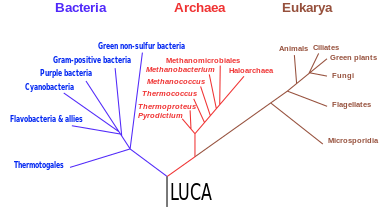
Back Laaste universele gemeenskaplike voorouer Afrikaans سلف شامل أخير Arabic Последен универсален общ предшественик Bulgarian Últim avantpassat comú universal Catalan Poslední univerzální společný předek Czech Юлашки универсаллă пĕрлĕхлĕ несĕл CV Sidste fælles forfader Danish Urvorfahr German Último antepasado común universal Spanish Viimane ühine eellane Estonian

The last universal common ancestor (LUCA) is the hypothesized common ancestral cell from which the three domains of life, the Bacteria, the Archaea, and the Eukarya originated. It is suggested to have been a "cellular organism that had a lipid bilayer and used DNA, RNA, and protein".[2] The LUCA has also been defined as "a hypothetical organism ancestral to all three domains".[3] The LUCA is the point or stage at which the three domains of life diverged from preexisting forms of life (about 3.5–3.8 billion years ago). The nature of this point or stage of divergence remains a topic of research.
All earlier forms of life preceding this divergence and all extant organisms are generally thought to share common ancestry. On the basis of a formal statistical test, this theory of a universal common ancestry (UCA) is supported versus competing multiple-ancestry hypotheses. The first universal common ancestor (FUCA) is a hypothetical non-cellular ancestor to LUCA and other now-extinct sister lineages.
The genesis of viruses, before or after the LUCA as well as the diversity of extant viruses and their hosts are subjects of investigation.
While no fossil evidence of the LUCA exists, the detailed biochemical similarity of all current life (divided into the three domains) makes it plausible. Its characteristics can be inferred from shared features of modern genomes. These genes describe a complex life form with many co-adapted features, including transcription and translation mechanisms to convert information from DNA to mRNA to proteins. The earlier forms of life probably lived in the high-temperature water of deep sea vents near ocean-floor magma flows around 4 billion years ago.
- ^ Cite error: The named reference
Woese Kandler Wheelis 1990was invoked but never defined (see the help page). - ^ Cite error: The named reference
Brock_2022was invoked but never defined (see the help page). - ^ Cite error: The named reference
Harold_2014was invoked but never defined (see the help page).
© MMXXIII Rich X Search. We shall prevail. All rights reserved. Rich X Search